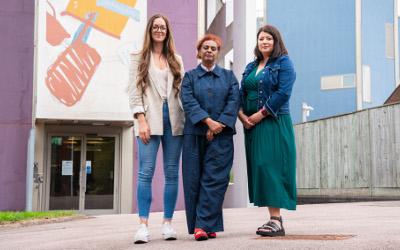EU Horizon Europe £2.7M research funding to manage extremism

An OU researcher is leading an international team which will develop new tools to manage extremism.
Kesi Mahendran, Professor of Social and Political Psychology at The Open University (OU), is the scientific co-ordinator of OppAttune, a project which has received £2.72m research funding, (€3.16m) to help people manage the development of extremist views at home and abroad in the run up to major political events.
The administrative co-ordinator is Panteion University in Greece.
The funding has come from the European Commission’s Horizon Europe programme involving 17 partners across Europe and beyond its borders.
“We are very pleased that we have managed to navigate the new post-Brexit Horizon funding landscape and are leading such a key project aimed at fostering democratic debate,” said Professor Mahendran
Tool to show if our views are extreme
The over-arching project is known as OppAttune and includes the development of a tool designed specifically for key target audiences to enable more productive democratic debate.
The researchers plan to have the free self-test tool kit, known as I-Attune, available on the OU's OpenLearn platform in 2025 to help citizens globally engage politically with each other without resorting to extremes. It will be available initially for three years but could be rolled out further.
The project will allow citizens to assess three key aspects: their own susceptibility to extremism; their capacity to tune into other positions and their ability to sustain dialogue in highly polarized situations.
Professor Mahendran said: “This is a way of measuring everyday extremism and to benchmark it. We will look at topical case studies such as immigration and people’s reactions to the climate change.”
Tackling everyday extremism
The OppAttune project brings together an ambitious multi-disciplinary team. It uses psychological, communication studies, anthropological, social scientific, and historical research, as well as input from former government analysts to study extremism and how politics and public opinion intersect.
It explores new methods for understanding public decision-making beyond charting social attitudes and public-opinion polling and it promises to have a strong scientific impact during and beyond its lifetime.
Critically, the project designs inclusive and open ways of sharing knowledge gained by academics and will find tools and mechanisms for future public engagement initiatives for NGOs working in the field. It aims to benchmark and begin discussions about everyday extremism.
Partners include:
The Open University (OU) UK (Scientific Co-Ordinator); Panteion University (Panteion) Greece – (Administrative Co-Ordinator); Glasgow Caledonian University (GCU) UK; American University in Paris (AUP) France; Malmö University (MAU) Sweden; Cultures Interactive (CI) Germany; Oesterreichische Akademie Der Wissenschaften (OEAW) Austria); Universita Ta Malta (UoM) Malta; Özyeğin University (OzU) Turkey; Istanbul Bilgi Universitesi (Bilgi) Turkey; University of Cyprus (UCY) Cyprus; Institut Jozef Stefan (JSI) Slovenia; Universidade De Coimbra (UC) Portugal; International Security Affairs Centre (ISAC) Serbia; Kosovar Centre for Security Studies (KCSS) Kosovo; Hammurabi Human Rights Organization (HHRO) Iraq and the PRONI Center (PRONI) Bosnia and Herzegovina.
This story written by Philippa Green, originally appeared on OU News.
You may also be interested in:
Contact our news team
For all out of hours enquiries, please telephone +44 (0)7901 515891
Contact detailsNews & articles

OU researchers lead international advances in planetary protection
Open University researchers are leading international advances in planetary protection, helping ensure that space exploration is safe, sustainable, and scientifically rigorous.